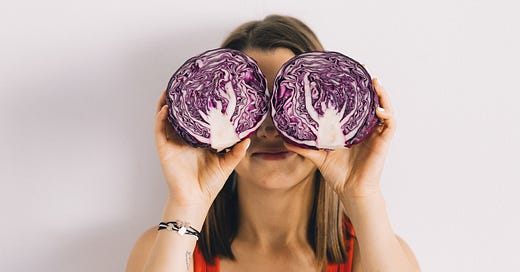Unexpected Things That Spike Your Blood Sugar
Blood sugar balance isn’t just about food—here’s what else might be at play.
Here's an unpopular opinion: you can eat the cleanest, healthiest diet and still struggle with blood sugar balance. Because there's more than just food that influences your blood sugar stability—or imbalance.
The Importance of Blood Sugar Balance
By now, I think we’re on the same page when I say that blood sugar balance is a non-negotiable pillar of optimal health. It impacts everything from mood and energy levels to hormonal health and metabolic function.
In the short term, blood sugar highs and crashes can lead to skin breakouts, feeling "hangry," mood swings, brain fog, fatigue, poor sleep, nighttime wake-ups, or even full-blown insomnia.
Long-term, unstable blood sugar can be a root cause of hormonal imbalances, autoimmune issues, systemic inflammation, PCOS, insulin resistance, type 2 diabetes, and more severe skin conditions like psoriasis and eczema. It’s also linked to fatty liver disease and even Alzheimer’s, often referred to as "Type 3 Diabetes."
But what if you’re already eating well, avoiding sugar spikes, and still dealing with energy dips, cravings, or mood swings? The culprit might not be food at all.
Let’s explore some of the most unexpected (and less talked about) things that can spike your blood sugar.
1. Poor Sleep
There’s a bit of a Catch-22 here: poor sleep leads to blood sugar imbalances, and frequent glucose spikes and crashes can disrupt sleep quality.
Even just one night of poor sleep makes you more insulin-resistant the next day. That means the same meal, eaten at the same time, will cause a significantly higher blood glucose response after a bad night compared to a well-rested one.
When sleep is compromised, the body produces more cortisol (a stress hormone), which directly impacts insulin sensitivity and glucose metabolism. This is why you might find yourself craving carbs and sugar after a rough night—it’s your body's way of trying to compensate for the lack of energy.
Prioritizing good sleep hygiene is one of the simplest yet most effective ways to support balanced blood sugar levels.
2. The Phase of Your Menstrual Cycle
As women, our hormones naturally fluctuate throughout the month, and these shifts impact blood sugar levels.
During the luteal phase (the second half of the cycle, after ovulation), we tend to become more insulin-resistant. This means our bodies are more prone to blood sugar spikes—especially if we're indulging in more simple carbs (hello, cravings!).
While it’s normal to crave carbs before your period, opting for complex carbs like root vegetables, sweet potatoes, or cooked and cooled rice can support a more stable glucose response and help reduce PMS symptoms.
3. Alcohol
We often think about blood sugar only in relation to food, but beverages matter too.
Alcohol is particularly interesting because it can either lower or spike blood sugar, depending on the type and amount consumed.
Wine, prosecco, and spirits like gin or vodka tend to keep glucose levels steady or even lower them slightly.
Beer and sugary cocktails, on the other hand, can cause significant spikes.
Another factor to consider is that alcohol can impair liver function, which plays a crucial role in blood sugar regulation. Your liver prioritizes metabolizing alcohol over maintaining stable glucose levels, which can lead to unpredictable blood sugar swings.
4. Stress
When we’re stressed, our bodies go into “fight or flight” mode, releasing cortisol and adrenaline. These hormones cause a surge in glucose to provide quick energy—historically, to help us escape threats.
The problem? Your body doesn’t distinguish between life-threatening danger and modern-day stressors like work deadlines, relationship struggles, or even running late. That presentation at work might give you a bigger glucose spike than your lunch.
Chronic stress means chronically elevated blood sugar, which can contribute to insulin resistance over time. This is why managing stress—through breathwork, movement, time in nature, or mindfulness—is just as crucial as what’s on your plate.
5. Being Sick
Ever noticed that your cravings and energy levels shift when you’re coming down with something? That’s because when your body is fighting an infection, it releases stress hormones to mobilize energy. This naturally raises blood sugar levels.
If you’re sick, your priority should be rest, hydration, and nourishment—not stressing about perfect blood sugar control. Focus on nutrient-dense, easily digestible foods, and be mindful that your glucose might be elevated while your body fights off illness.
6. Dehydration
Water plays a crucial role in maintaining blood sugar balance. When you’re dehydrated, your blood becomes more concentrated, leading to higher blood glucose levels.
Drinking enough water supports insulin sensitivity, helps your kidneys flush out excess glucose, and prevents unnecessary spikes.
Aim to sip water consistently throughout the day rather than chugging large amounts at once. And if you’re active or live in a hot climate, you might need to replenish electrolytes to stay optimally hydrated.
7. Toxins & Endocrine Disruptors
Certain environmental toxins—like chemicals found in plastics, beauty products, and household cleaners—can interfere with insulin sensitivity and contribute to metabolic dysfunction.
Your liver plays a huge role in blood sugar regulation, and when it's overburdened with toxins, it can't function optimally. Reducing your toxic load by choosing cleaner beauty and home products can be a small but meaningful step in supporting blood sugar balance.
Final Thoughts
Blood sugar balance isn’t just about what’s on your plate—it’s influenced by so many aspects of your daily life. If you’re eating well but still experiencing symptoms of dysregulated blood sugar, consider looking at your sleep, stress levels, hydration, and environment.
Which of these factors surprised you the most? Let me know in the comments!
In case you missed my previous Wholesome Wednesday article:
The Truth About Stomach Acid: Why Too Little (Not Too Much) Is the Real Problem
Last week, for Wholesome Wednesday, we talked about ways to support digestion and a healthy microbiome. One key factor? Making sure you have optimal stomach acid (HCl).
Thank you! ✨
A heartfelt thank you to everyone who supports my work here on Substack.
✨ P.S.
If you know someone facing health challenges related to blood sugar balance, hormonal or metabolic issues, or someone looking to take an active role in their health journey—or even someone who simply enjoys eating whole foods for better health—would you forward my Substack to them? I’d love it if you could share my page with a friend or restack it to your notes. Your support means so much to me—thank you! ✨
Stay wholesome,
Karina









There are a lot of non-food factors that contribute to a good sugar balance or a bad one. Thanks for this article
This is definitely important stuff. I like how you referred readers to previous articles.